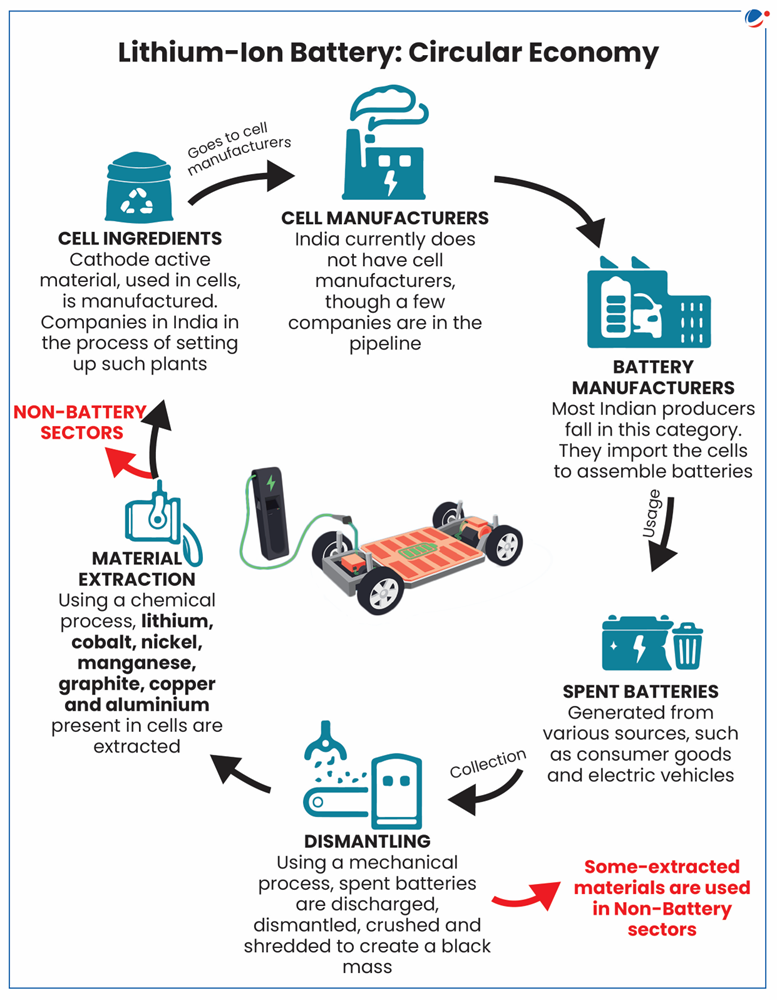Extended Producer Responsibility (EPR) for E-Battery Waste Management
As the world embraces electrification and renewable technologies, the usage of batteries — especially lithium-ion and other rechargeable types — has increased exponentially. With this rapid growth comes a mounting responsibility to manage battery waste sustainably. Green Sustainable Environmental Solutions (GSES) is committed to helping producers meet their obligations under Extended Producer Responsibility (EPR) for E-Batteries, in compliance with government regulations and environmental best practices.
What is EPR for E-Battery?
EPR mandates that producers, importers, and brand owners (PIBOs) are accountable for the entire lifecycle of batteries they place in the market. This includes collection, recycling, and safe disposal once the battery reaches its end-of-life stage. The goal is to ensure that battery waste, which may contain hazardous and valuable materials, is managed in a way that protects human health and the environment.
Our Role in E-Battery Compliance
At GSES, we offer end-to-end EPR services for e-battery management. Our solutions include:
Registration & Documentation: Assistance with CPCB registration and EPR plan submissions.
Collection Network: Building and managing reverse logistics for collecting used batteries from consumers.
Recycling Partnerships: Collaboration with certified recyclers for safe and compliant material recovery.
Reporting & Audit: Transparent tracking, compliance reporting, and annual EPR returns.
Awareness Programs: Educating consumers on proper disposal and the value of recycling e-batteries.
♻️ Environmental Protection: Ensures safe collection and recycling of hazardous battery waste, reducing soil and water pollution.
🔋 Resource Recovery: Promotes recovery of valuable metals (like lithium, cobalt), reducing the need for virgin materials.
🏭 Compliance Assurance: Helps producers meet government regulations under EPR Battery Management Rules.
📉 Waste Reduction: Minimizes the number of batteries reaching landfills or informal disposal channels.
- 💼 Brand Responsibility: Enhances brand image by demonstrating commitment to sustainable practices.
🔄 Circular Economy Support: Encourages reuse and recycling, contributing to a circular economy in the battery sector.
📊 Data Transparency: Provides traceability and proper documentation of battery waste handling.
🛡️ Reduced Environmental Liability: Lowers risk of environmental penalties and liabilities through proper disposal systems.


Why it Matters
Batteries often contain heavy metals and chemicals that can be hazardous if not properly disposed of. However, they also contain recoverable materials like lithium, cobalt, and nickel, which can be reintroduced into the supply chain, reducing the need for virgin resource extraction. EPR helps create a closed-loop system that minimizes environmental impact and supports India’s sustainable development goals.
Partner with GSES
Join hands with GSES and turn regulatory compliance into a sustainability advantage. Together, we can build a cleaner, greener future through responsible battery waste management.
Quality and Reliability
At GSES, our foremost focus is on delivering quality and reliability. Every project we undertake is made possible through the invaluable support of our clients, making them all supplementary endeavors. We guarantee that each project adheres to rigorous standards such as the Verified Carbon Standard, the GSES Community and Biodiversity Standard, or the Gold Standard, ensuring the utmost integrity and environmental impact.
Contact
- Block 23 B, Sector B, Sanwer Road, Industrial Area, Indore, M.P - 452010 (India)
-
+91 9098212176
+91 8827512675 - info@mediumpurple-ant-258386.hostingersite.com

